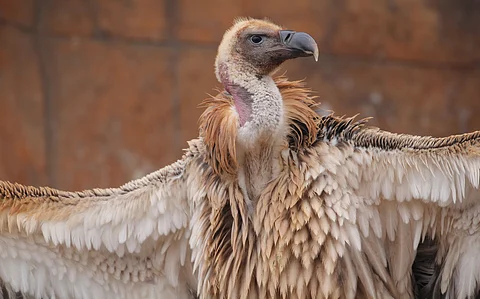

The Cape Vulture (Gyps coprotheres), an Old World vulture species that is resides exclusively in Southern Africa and is threatened due to dwindling numbers, has returned to South Africa’s Eastern Cape province after three decades, as per a statement by Vulpro, a nonprofit organisation dedicated to safeguarding African vultures.
Eighty-five wild Cape Vultures were sighted on a farm just 40 kilometres outside Mountain Zebra National Park, in Spitskop Cradock this week, the first sighting in over 30 years, the statement noted.
The sighting comes as a huge relief to conservationists.
“Since the 1980s, Cape Vulture numbers have been steadily declining. Between 1992 and 2007, populations in South Africa reduced by 60-70% and were first categorised as ‘threatened’. By 2021, the total population size was estimated at 9,600 to 12,800 mature individuals, which raised their status to ‘vulnerable’ showing their numbers were improving,” according to the statement.
However, vulture numbers overall are dramatically declining with some species experiencing reductions of up to 80 per cent in recent decades, leading to what is termed the ‘African Vulture Crisis’, it added.
There are 23 species of vulture globally. These are divided into two families: Accipitridae or Old World vultures, of which there are 16 species, are found across Africa, Europe, and Asia. Cathartidae or New World vultures, with seven species, are native to the Americas and the Caribbean.
“The 16 species of Old World vultures are spread across nine genera. Of these, nine species are either resident in Africa or migrate to and from the continent. Only three species — the White-headed Vulture, Hooded Vulture, and Cape Vulture — are exclusive to Africa with the Cape Vulture only resident to southern Africa alone,” the statement pointed out.
Vultures play a major role in the ecosystem. They dispose of carcasses quickly, thus preventing the spread of diseases like anthrax, botulism, and rabies among wildlife and humans.
Their absence would also lead to an increase in other scavengers, such as feral dogs and rats, which are less efficient at disposing of carcasses and can carry diseases harmful to humans and livestock.
“While we are starting to see some vultures return to historical roosting sites the rate of decline is still shocking and very worrying which is why we can’t stop our conservation efforts now. Sightings like this one near Graaff-Reinet shows that the work we are doing is making a difference which motivates us to keep working around the clock to curb further vulture species declines,” the statement quoted Kerri Wolter, chief executive and founder of Vulpro.